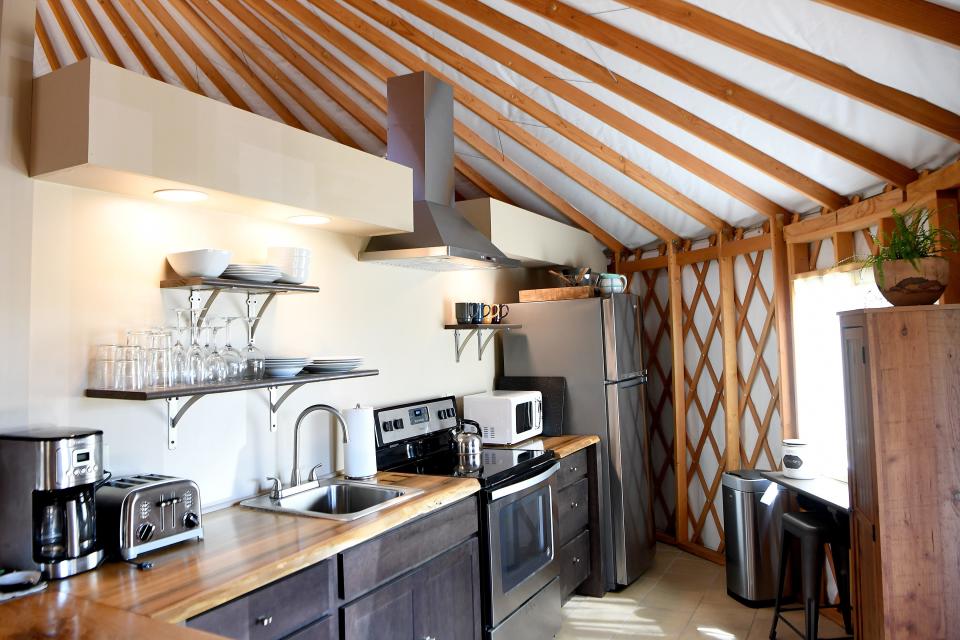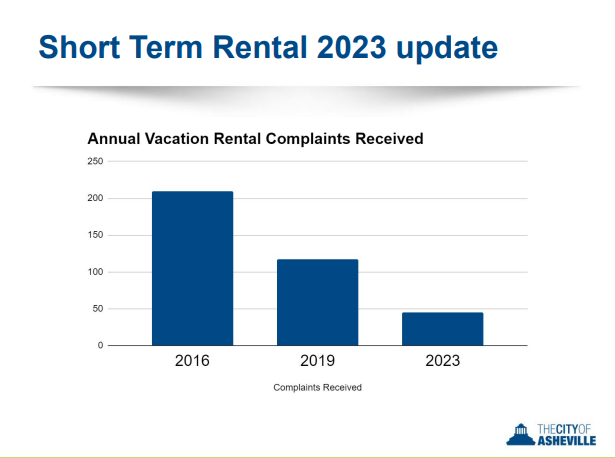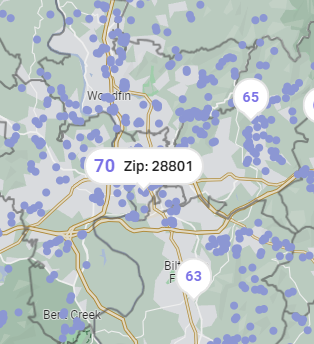Asheville short-term rental use up 57% since 2019. What is city regulation process?
ASHEVILLE - Since short-term rental regulations were updated to ban full home vacation rentals outside of designated zones in 2018, Buncombe County's short-term vacation rental market and homestay market has seen significant growth — as well as friction with the North Carolina General Assembly.
Now, an update on short-term vacation rental regulations was provided to city staff and of the city of Asheville during a Nov. 13 Planning and Economic Development Committee meeting, emphasizing a complaint-based regulatory system that has seen changes due to a 2022 court case that banned the city's use of annual permits.
Director of Development Services Mark Matheny presented on recent compliance efforts, along with discussing changes in the regulatory permitting process.

What is Asheville's current regulation process?
Two types of short-term rentals exist in Asheville — homestays and short-term vacation rentals. Homestays are where one or two rooms of a home are rented out while a long-term resident is also present, and are allowed in more zones than short-term vacation rentals, which are entirely independent, private rentals only allowed in zones districted for "resort."
For the city of Asheville's regulations, the compliance process typically starts with a complaint about a short-term rental. Once the complaint is received, the city verifies the complaint through a software company that "scrapes a large majority" of rental services such as Airbnb or Vrbo.
Next, the city reach out to the owner.
"If someone is advertising it, we make contact with them," Matheny said. "We try to have that happen within the first couple of days."
If compliance is not met after contact — or if contact is unable to be made — property owners are given a notice of violation which lasts 30 days. After the notice of violation ends, a daily fine of $500 begins. Once the fine totals "around $5,000" the city makes contact and attempts to bring the owner into compliance.
More: Fraudster Asheville Airbnb business owner facing denied public defender, for now
If compliance is met and a property owner decides to pay the fines, no further action is taken. Otherwise, the city takes the owner to small claims court.
In 2023, two cases were brought to small claims court by the city to bring homestays into compliance when they owed around $10,000 in city fines. Both cases ruled in favor of the city, totaling "about $15,000" and brought those rentals into compliance, Matheny said.
Previously, Asheville short-term rental compliance cases have ended in nearly $1 million in fines for one owner.
Though the city used to pay a third party to seek out those who are violating rental regulations, the process is currently "98%" complaint-based, Matheny said. The city still utilizes a third-party when verifying a complaint.
Complaints down, usage up; How many rentals?
For 2023, complaints for short-term rentals are "trending lower this year than they have in years past," Matheny said.
Yet, recent Buncombe County Tourism Development Authority statistics identify that nearly half — around 46% — of overnight stays in Asheville are now in short-term rentals.

The number grew from 116,059 stays in September 2019 to 174,385 in September 2023 — a 57% increase, according to an Oct. 25 "Destination Dashboard" report from the TDA.
As the city has moved to regulate the market, challenges are faced in tracking the number of rentals — new and old — in the area.
"I want to ask the hardest question — the question nobody ever gets an answer to," City Council member Sage Turner said.
"We are saying that just by our own math that we have 1,037 of these units — whether they are homestays or partial homes and you cannot Google Asheville on any of those AirDNA sites — I can't even remember the names of all of them — and find less than 2,000," she said.
"How are we reconciling this?" Turner asked.

Turner is correct. The city numbers don't match the purported numbers of Asheville's short-term rentals on rental data sites like AirDNA, which states that there are nearly 2,868 available short-term rentals in Asheville.
The explanation for the discrepancy? Many short-term tracking websites are not looking at the boundaries of the city of Asheville.
"It says Asheville, but really what they're talking about is kind of the regional area of Asheville," Matheny said of the confusion.
The 1,037 rentals reported by the city of Asheville on Nov. 13 — split between 176 legal short-term vacation rentals and 861 homestays — matches similar July Citizen Times reporting.
In July, the Buncombe County TDA reported that 1,031 are inside city limits, or 20% of the 5,223 rentals reported countywide in 2022 — roughly reflecting a similar number of currently approved homestays or short-term vacation rentals.
However, with changing permit regulations, tracking has become more difficult.
"Because the permitting requirement has come away from where it was early on it has actually made it harder to even keep track," Matheny said.
Matheny believes the city has a better understanding of the number of homestays, rather than the number of short-term vacation rentals.
A look back at Airbnb and housing: The Airbnb effect: Short-term rentals alter housing markets in WNC
Airbnb fraud: Jailed Asheville Airbnb business owner, bank fraudster, appeals federal property seizure
Wilmington case changes permit process, regulation funding
A major change between 2018 and 2023 was a Wilmington court case that declared that cities cannot force rental owners to register their rental properties — a major change for Asheville's homestay and short-term rental permitting process.
Now, fees for homestays — a $208 zoning application and technology fee — are charged once per homestay and do not need to be renewed annually, as the language changed from a short-term rental permit to a zoning permit, Matheny said.
"We can do this if it sounds like a zoning permit, Matheny said. "But if it starts to get into anything else, then that kind of fits into what the Wilmington case turned into."
Turner made the observation that the fees used to pay for those on staff who enforced regulatory measures.
"These permit fees used to cover the salaries of the people that did enforcement and now we don't have that income," Turner said. "So it's an interesting new cost to the city."
Creative solutions for permitting and regulations?
Though four government bodies around Asheville have considered or looked at short-term rental regulations — Black Mountain, Buncombe County, Weaverville and Woodfin — most have not instituted such policies.
The exception is Woodfin, which recently passed a similar regulatory measure to Asheville's 2018 legislation — where the town council moved to focus on homestays while limiting new short-term rentals to Community Shopping and Light Industrial zoning districts.
For City Council member Maggie Ullman, changing zoning or modifying zoning regulations would be an answer to solving the issues with the permitting process.
"Zoning is the primary mechanism we have available," Ullman said during the meeting.
Senior Assistant City Attorney Jannice Ashley specified that the city likely wouldn't be changing zoning, but would use "zoning kind-of regulations to the extent there are negative impacts from the homestays."
"If we wanted to look at focusing and targeting where STR's are and limiting them in places that we want homes — I'd be open to having that conversation," Ullman said.
More: Asheville's Cherokee Center revisits booking policies after Bassnectar show cancellation
Will Hofmann is the Growth and Development Reporter for the Asheville Citizen Times, part of the USA Today Network. Got a tip? Email him at WHofmann@citizentimes.com.
This article originally appeared on Asheville Citizen Times: Asheville Airbnb usage increases 57% from 2019 complaints decrease

